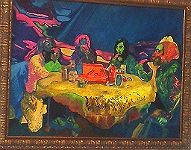A couple of weeks ago, I viewed the YouTube recording of the question and answer period during Wilders's presentation at the Harvard Club, and meant to write about it much earlier.
Perhaps it is better that I waited some time before commenting on it, since it is in accordance with what I have been observing with the counter-Jihad movement, with its addiction to spelling out all the pros and the cons, splitting hairs on radical vs. moderate, and inadvertently (via good-willed charity activities, for example, that I talked about here) making things worse.
I have written out Wilders's complete response to a comment/question about compromise. But it is well worth listening to the response, which starts around the 4:23 point and goes to the end of the recording, to see Wilders's calm and sensible manner elucidating all the facts (and problems) for us.
Here is Wilders's response to a question/comment about not compromising:
We should not compromise too much on this most important issue…My party will not go into any government if we have to compromise too much on the issues I just spoke about.He continues how the only solution is to gather a momentum through democratic processes, grass-roots movements and other organizations.
There is only one way, and that is the way through the democratic[al] process. You can start from the grass roots level organizations…It should be done in the democratic[al] way with parties that hare not willing to compromise too much.Many have marveled at the popular support for Wilders's Freedom Party (PVV). A November 3, 2009 article for Europe News declares that "Wilders would be prime minister if elections were held now."
How did Wilders get it so right? Partly it is his uncompromising position. Partly it is his analysis of the problem in manageable, realistic terms. Partly it is his clear understanding of the powers of Islam, with its hold on its millions of worshipers and its desire to subjugate the whole world. But here is what he says about who sees this reality and who doesn't.
The difference between the political elite and the vox populi is enormously high [in Europe] especially on this issue. And not only because people really have read the Koran or know everything that I am talking about.He talks about the changes this vox populi has to endure on a daily basis that makes it much more alert to the problems.
People see there are changes, and they see every day again that there are changes in their neighborhoods and their schools, when it comes to their security, when they take a bus or go on the metro. They see the changes, and they see the changes for the worse. They see the country changing and having another kind of identity. And people are fed up with that.This is exactly why I called my blog Our Changing Landscape when I became overwhelmed at the incremental changes I kept seeing around me, which this blog has been documenting since September 2008 (and about a year before that through Camera Lucida).
Wilders asks this tough question:
The question is, will we be [on] time? Will we be [on] time to have [to react to] those kinds of changes?But, then he knows this isn't the time to capitulate, and finishes off with:
That is why I’m saying enough is enough. We have to stand up. We have to stop being on the defens[ive]. We have to go on the offens[ive].
There is no other way.






